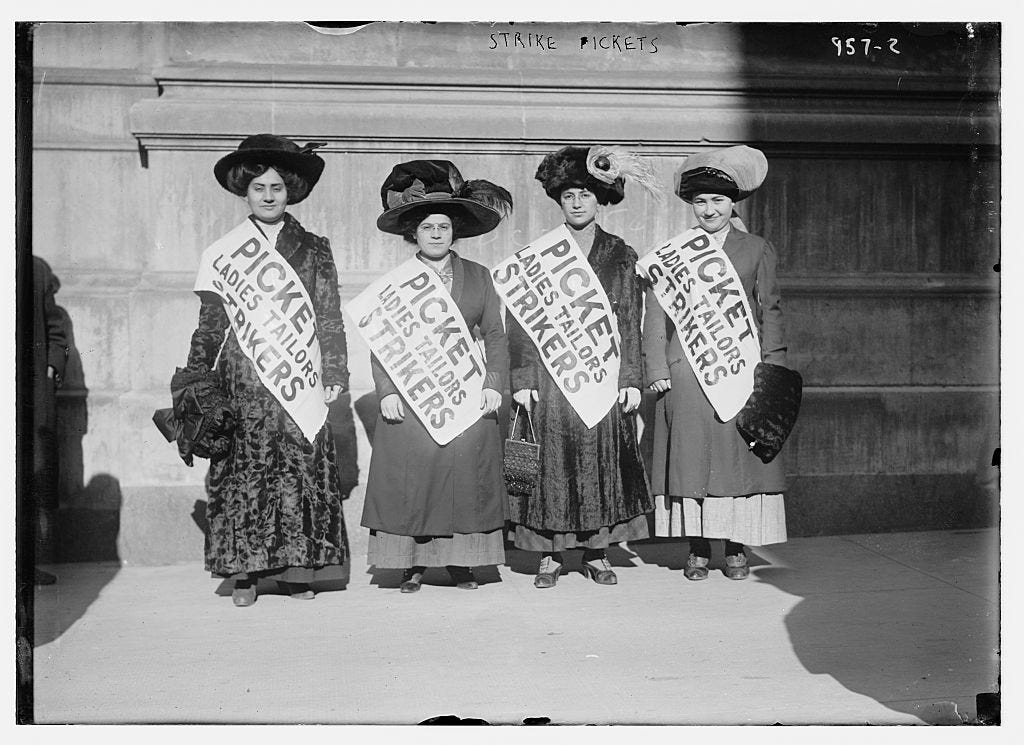
Happy Labor Day! In honor of today (and yes, we know the real labor day is actually May Day, yet here we are), we’ve compiled some of the best labor-themed stories we’ve done since we launched in March. Journalism about work and workers is one of the cornerstones of Discourse Blog—the title of this blog is a riff on one of our first big stories—and we intend to keep doing it for as long as we’re around. If you would like to support that effort, please subscribe. Fuck bosses, long live unions.
Click the links to read any of these stories in full.
“The Pro-Death Brigade Has Logged On,” by Jack Mirkinson:
What these people are really saying is that we should be prepared to tolerate just a smidge of mass death in order to keep people at work. That is what it means when you say you are prepared to "let those with a lower risk" just do their thing again. You are saying that the prospect of those people getting coronavirus and infecting other people is worth the price if it means Goldman Sachs can function at full speed again.
“How Not to Do Labor Journalism 101,” by Paul Blest:
NPR very rarely reports out a political story that doesn’t at least try to get comment from both Democrats and Republicans. How is it possible, then, that the same outlet can publish labor stories like this one without even talking to workers?
“Elon Musk Made Me a Socialist,” by Jack Crosbie:
When I started reporting on Elon Musk, I too thought my rich and smart bosses were looking out for me. What working at the company taught me was that they are not. Elon Musk does not care about taking me to Mars. My bosses did not care about making me a better writer, or getting me better health insurance, or paying me more than $50,000 (I got one raise). We were all told, in one way or another, to stick to sports.
“They Can’t Even Fire Us Right,” by Jack Crosbie:
There is no good way to get fired. But you would think that, after close to 8,000 [media industry] layoffs in 2019 alone and hundreds more in the first half of 2020, that the people in charge would have the shit-canning process down pat. They do not. Here are some stories from people about how they were laid off.
“We’re All Bosses Now,” by Katherine Krueger:
This rating of everything attempts to enlist us as snitches in the corporation’s grand scheme to surveil its army of contract employees. Did you have a bad experience because the driver played music you don’t care for, or is the food bad because the driver’s long route made it arrive cold? It couldn’t matter less. It’s a system that incentivizes the most petty and tyrannical aspects of human nature, and I refuse to play ball.
“We have tech workers volunteering to send out the next email that will probably get them fired. I do think that workers will win this fight. A few more people may need to be fired, but I do think we’re standing on the right side of history, and it’s just a matter of time.”
“Labor Needs to Kick the Cops Out Now,” by Paul Blest:
Tomorrow’s workers are knocking at the door. This is the time not only to cut the ties with the cops, but lay the foundations for a renewed organized labor movement that looks a lot like the protest movement we’re seeing now: Young, multi-racial, insubordinate and antagonistic towards the Democratic Party, and above all else, hungry for justice and angry as hell.
“Discourses With: Two Chicago Tenants’ Rights Organizers,” by Samantha Grasso:
“I think it was clear that there were going to be huge waves of layoffs and problems with paying rent. The demand to cancel rent became a rallying cry for a union. We employed a few different tactics to try to initiate a conversation with our landlord — calling the offices, asking what their plan is for the pandemic, [asking if they will] they consider rent cancellation. We were stonewalled, so it became clear that we had to escalate if we wanted to get any progress with our landlord, and the city, state, and federal governments. We've organized rent strikes for two months, and withheld our rent in order to get our demands met.”
“Black Lives Matter on the Picket Line,” by Amir Khafagy:
On May 5th, a small-but-determined group of hoppers—what New Orleanians call trash collectors because they hop on and off the truck—formed the City Waste Union and walked off the job. The group of 26, all of whom are Black men, decided to strike in the face of an unprecedented public health crisis, and what they say is the trash company’s failures to protect them.
Metro then replaced them with prison labor.
“Why They’re Not Calling It a Strike,” by Katherine Krueger:
As lawmakers have sought to chip away at union rights since the New Deal enshrined them, it’s been a smart, fairly recent sleight of hand for neoliberals to push for Americans to view ourselves as “consumers,” not workers, first. Workers have the power to organize against capital and wield collective power, so it’s in the interest of the powerful for us to internalize politics, cut off from the knee of any broader movement.
That’s why we hear so much noise about boycotts: If, say, supporting Black Lives Matter is as simple as shopping at this grocery store as opposed to another one, it’s within your personal power to feel like you’re influencing politics. True boycotts can be powerful, but framing political change as a consumer choice rather than something we must forcefully demand from our elected officials conveniently lets them off the hook when they do nothing. It also further atomizes us when solidarity is what we need most.




